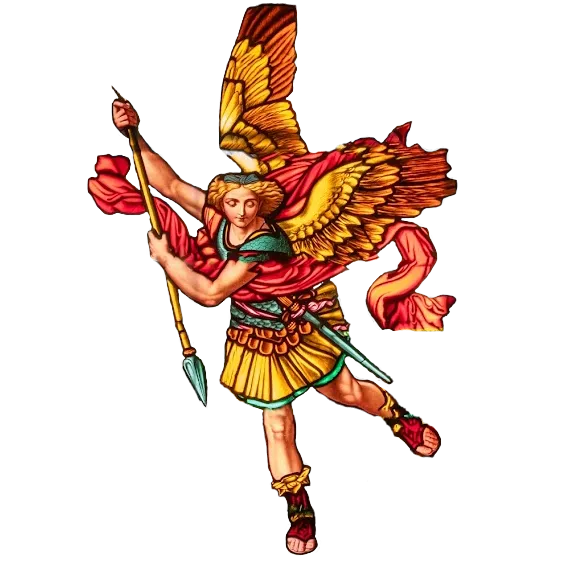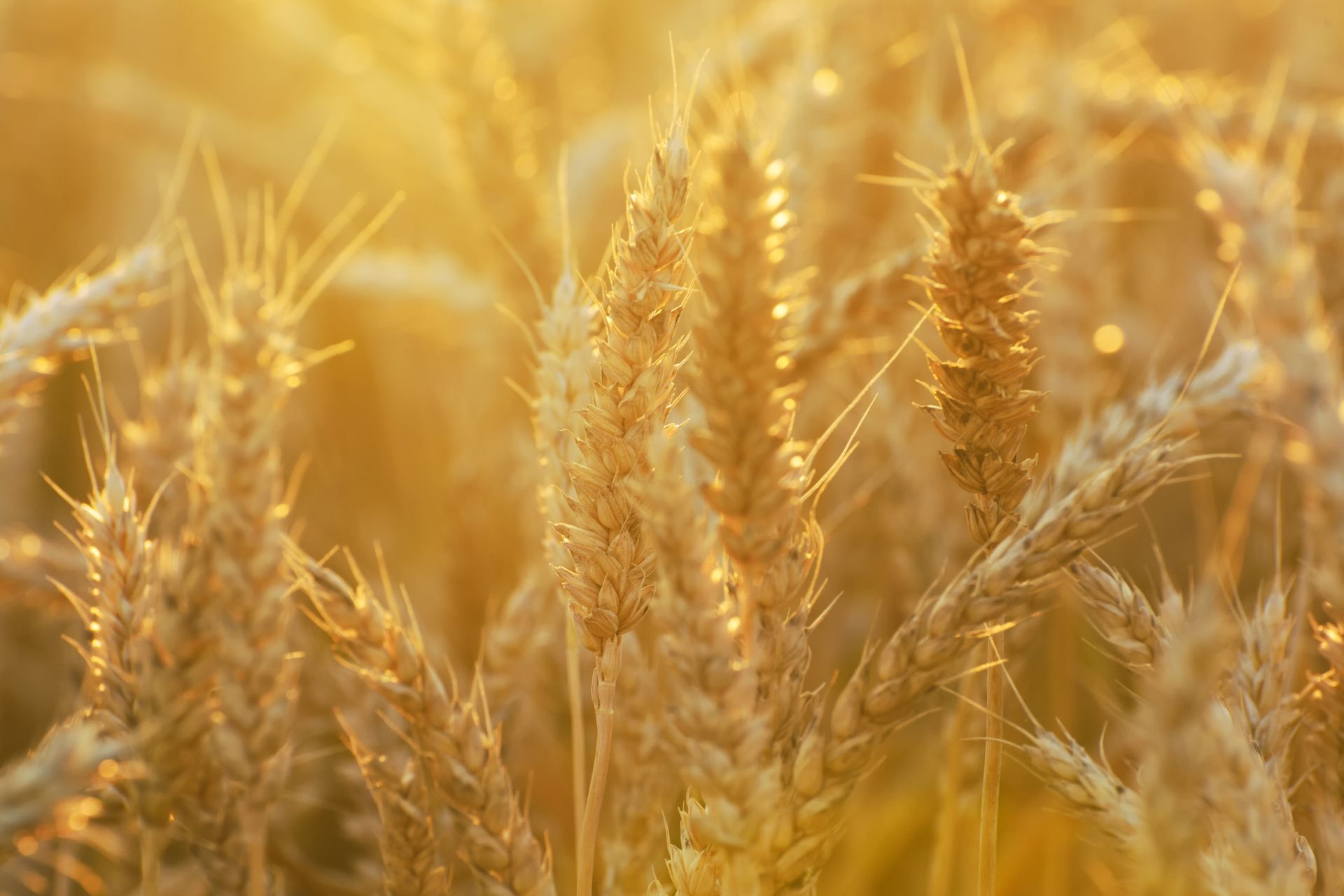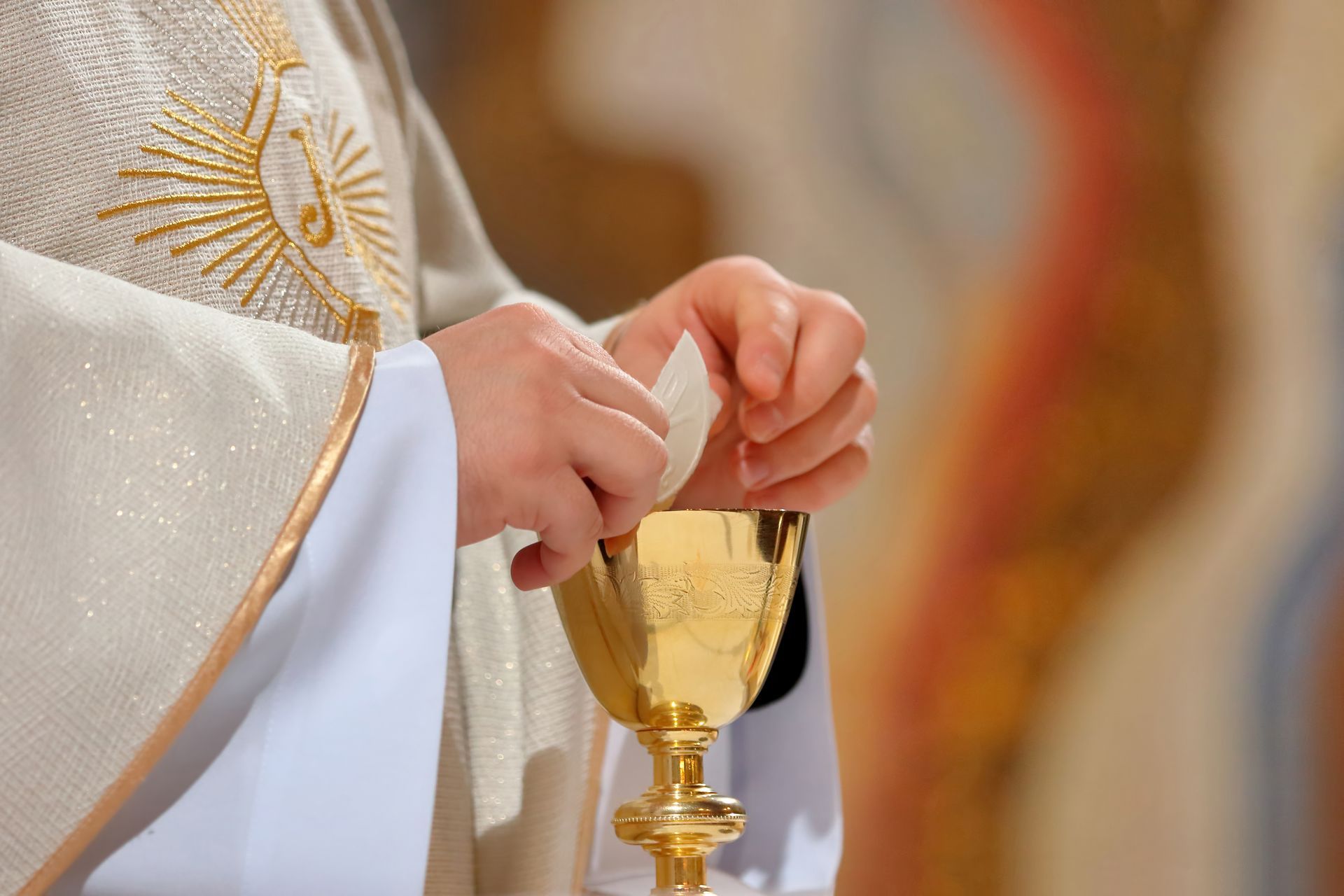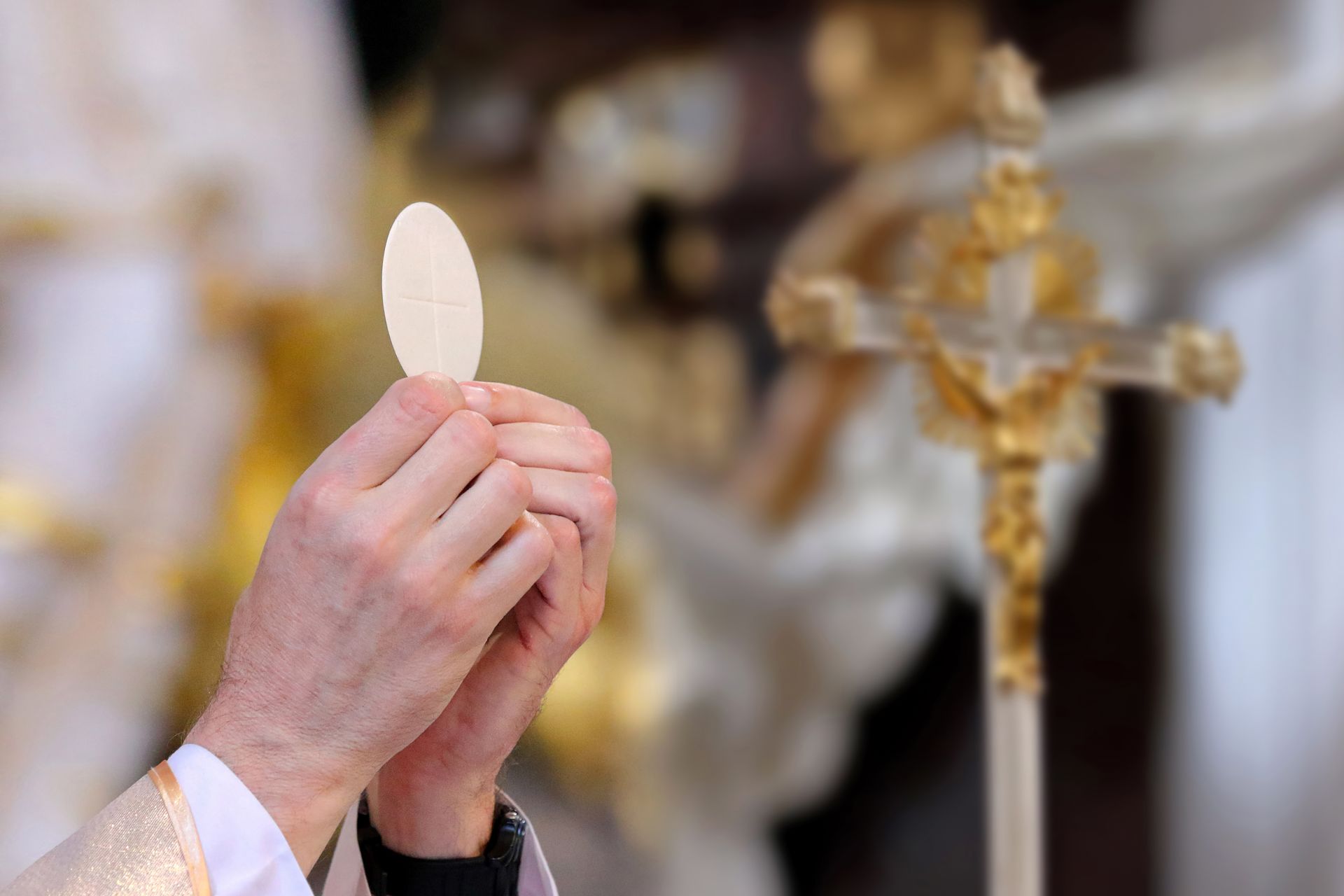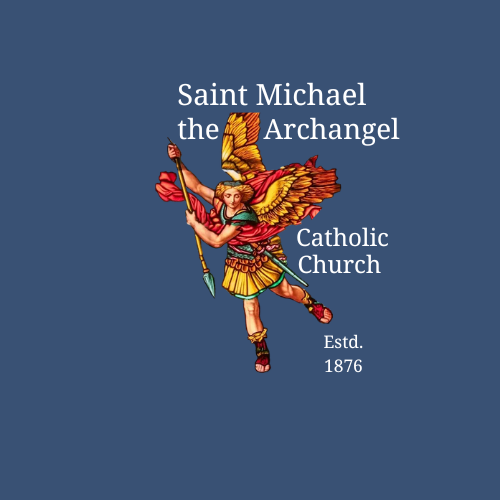Eucharist
Jesus said to them, "Amen, amen, I say to you, unless, you eat the flesh of the Son of Man and drink his blood, you do not have life within you."
What is the Holy Eucharist?
The Holy Eucharist, in which the faithful receive the Body and Blood of Christ, is the ultimate sign of our sharing in the divine life of Christ as well as of our status as one Body in Christ.
In the Gospel of Saint John, Christ identified himself as "the bread that came down from heaven"(John 6:41). At the Last Supper he took the bread and the cup filled with wine and said, "This is my body....This is my blood of the covenant" (Matthew 26:27-28).
Each time a bishop or priest repeats these words of consecration in the Mass, the substance of the bread and wine is changed into the Body and Blood of Christ by the power of the Holy Spirit. (Cf. CCC 1365,1374,1376)
Because the members of the Church are one Body in Christ, we partake of the one bread, the Body of Christ, in the Eucharist, "the fount and apex of the whole Christian life" (LG 11). Holy Communion is thus a rich symbol of our unity in Christ and of Christ's presence dwelling within us. (Cf. CCC 805, 1384, 2120)
Christ's words in instituting this Sacrament at the Last Supper were unequivocal:
"This is my body...This cup is the new covenant in my blood."
(Luke 22: 19-20)
The Church teaches that Jesus is truly, really, and substantially present-in His Body, Blood, Soul and Divinity-in the Eucharist. The Church has always recognized Christ's Real Presence in the Eucharist.
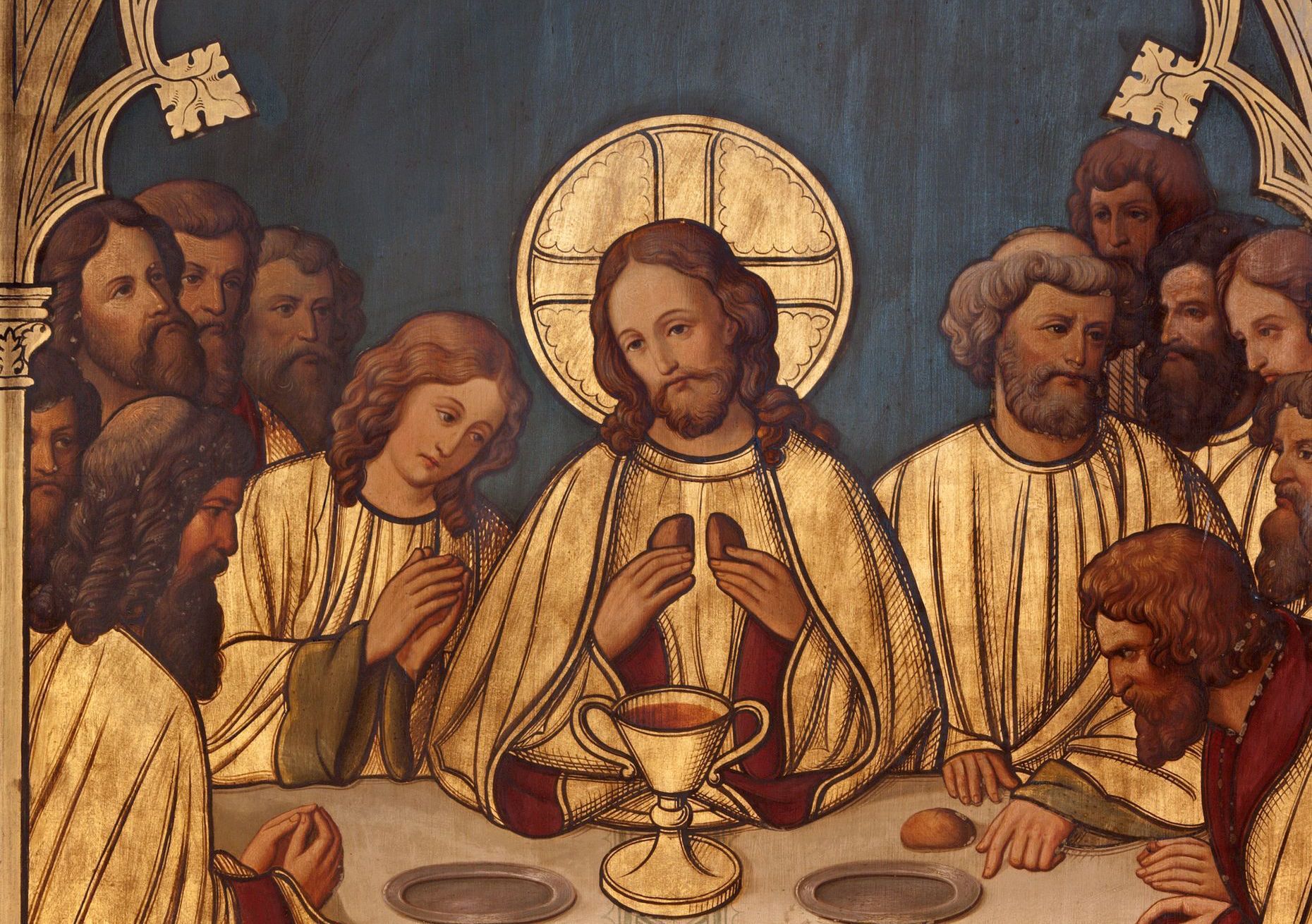
The bread and wine consecrated by the bishop or priest in the Liturgy of the Eucharist become the Body and Blood of Christ. The priest, through the power of his ordination and the action of the Holy Spirit, transforms the bread and wine into the Body and Blood of Jesus. This change in the Eucharistic species in which the substance of the bread and wine become the Body and Blood of Christ is called transubstantiation.
In the Eucharist, Christ remains truly and totally present under the appearances of bread and wine. He offers his Body and Blood to us in Holy Communion to be nourished by his divine life. The Eucharist is, therefore, not merely a symbol of Christ's presence but also the active presence of Christ himself, who gives himself to us unconditionally so our lives might be united to his life intimately. (Cf. CCC 1323-1325)
Jesus said to them, "Amen, amen, I say to you, unless you eat the flesh of the Son of Man and drink his blood, you do not have life within you. Whoever eats my flesh and drinks my blood has eternal life, and I will raise him on the last day. For my flesh is true food, and my blood is true drink. Whoever eats my flesh and drinks my blood remains in me and I in him."
What is this Sacrament Called?
The inexhaustible richness of this sacrament is expressed in the different names we give it. Each name evokes certain aspects of it. It is called:
Eucharist, because it is an action of thanksgiving to God. The Greek words eucharistein and eulogein recall the Jewish blessings that proclaim - especially during a meal - God's works: creation, redemption, and sanctification.
The Lord's Supper, because of its connection with the supper which the Lord took with his disciples on the eve of his Passion and because it anticipates the wedding feast of the Lamb in the heavenly Jerusalem.
The Breaking of Bread, because Jesus used this rite, part of a Jewish meat when as master of the table he blessed and distributed the bread, above all at the Last Supper. It is by this action that his disciples will recognize him after his Resurrection, and it is this expression that the first Christians will use to designate their Eucharistic assemblies; by doing so they signified that all who eat the one broken bread, Christ, enter into communion with him and form but one body in him.
The Eucharistic assembly (synaxis), because the Eucharist is celebrated amid the assembly of the faithful, the visible expression of the Church.
The
memorial of the Lord's Passion and Resurrection.
The Holy Sacrifice, because it makes present the one sacrifice of Christ the Savior and includes the Church's offering. The terms holy sacrifice of the Mass, "sacrifice of praise," spiritual sacrifice, pure and holy sacrifice are also used, since it completes and surpasses all the sacrifices of the Old Covenant.
The Holy and Divine Liturgy, because the Church's whole liturgy finds its center and most intense expression in the celebration of this sacrament; in the same sense we also call its celebration the Sacred Mysteries. We speak of the Most Blessed Sacrament because it is the Sacrament of sacraments. The Eucharistic species reserved in the tabernacle are designated by this same name.
Holy Communion, because by this sacrament we unite ourselves to Christ, who makes us sharers in his Body and Blood to form a single body. We also call it: the holy things (ta hagia; sancta) - the first meaning of the phrase "communion of saints" in the Apostles' Creed - the bread of angels, bread from heaven, medicine of immortality, viaticum. . . .
Holy Mass (Missa), because the liturgy in which the mystery of salvation is accomplished concludes with the sending forth (missio) of the faithful, so that they may fulfill God's will in their daily lives.
-Catechism of the Catholic Church, paragraphs 1329-1332
The Sacrament of the Eucharist: Word on Fire
In the following three videos, Bishop Robert Barron discusses the Eucharist as a Meal, as a Sacrifice and as Real Presence.
Bishop Robert Barron is an author, speaker, theologian, and founder of Word on Fire, a global media ministry. Word on Fire reaches millions of people by utilizing the tools of new media to draw people into or back to the Catholic Faith.
The Eucharist as a Meal
The Eucharist as a Sacrifice
The Eucharist as the Real Presence of Christ
What are the origins of the Eucharist?
The origins of the Eucharist are found in the Last Supper that Jesus shared with his Apostles.
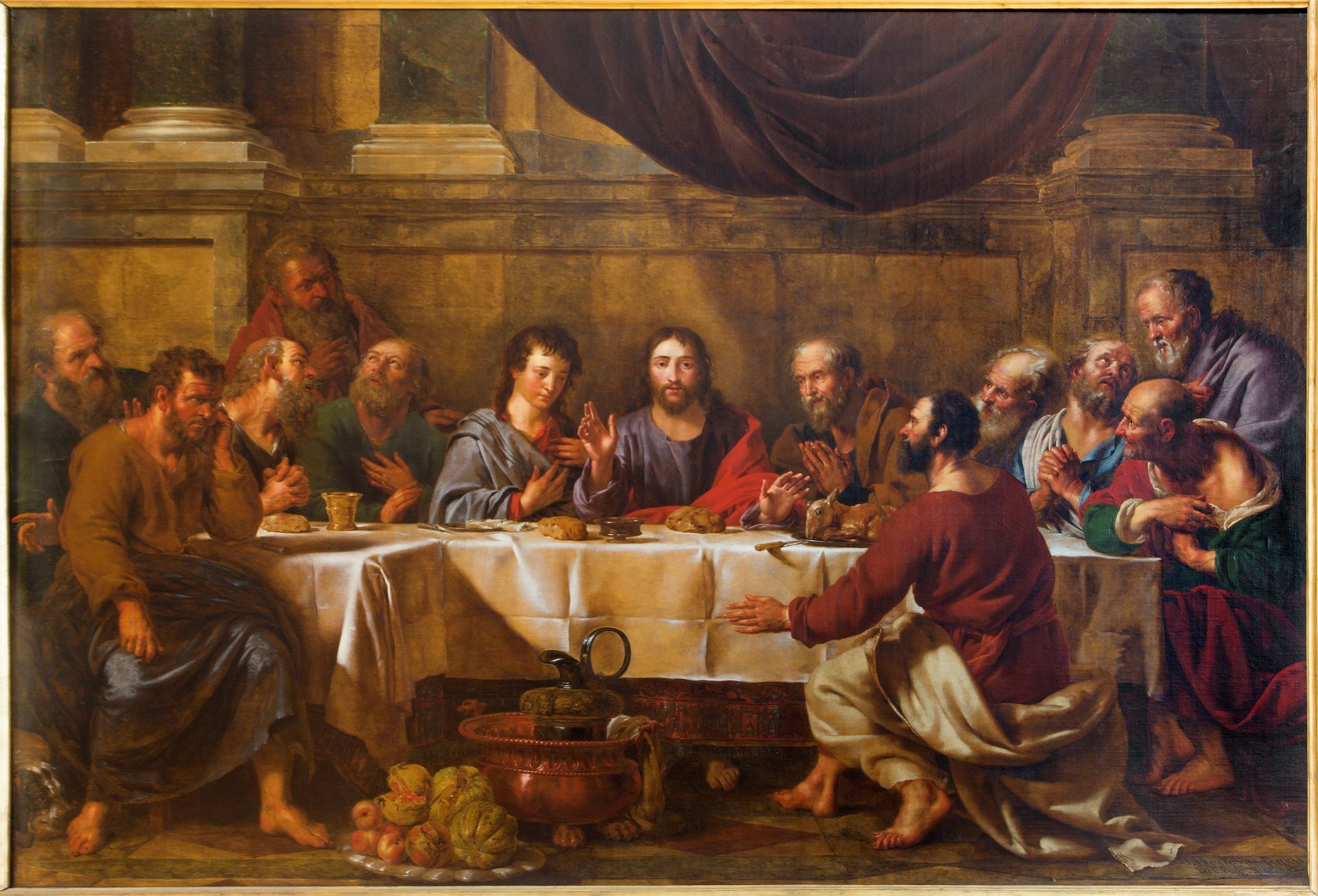
IThe Lord, having loved those who were his own, loved them to the end. Knowing that the hour had come to leave this world and return to the Father, in the course of a meal he washed their feet and gave them the commandment of love.
In order to leave them a pledge of this love, in order never to depart from his own and to make them sharers in his Passover, he instituted the Eucharist as the memorial of his death and Resurrection, and commanded his apostles to celebrate it until his return; "thereby he constituted them priests of the New Testament." (Council of Trent(1562):DS1740)
-Catechism of the Catholic Church, paragraph 1337
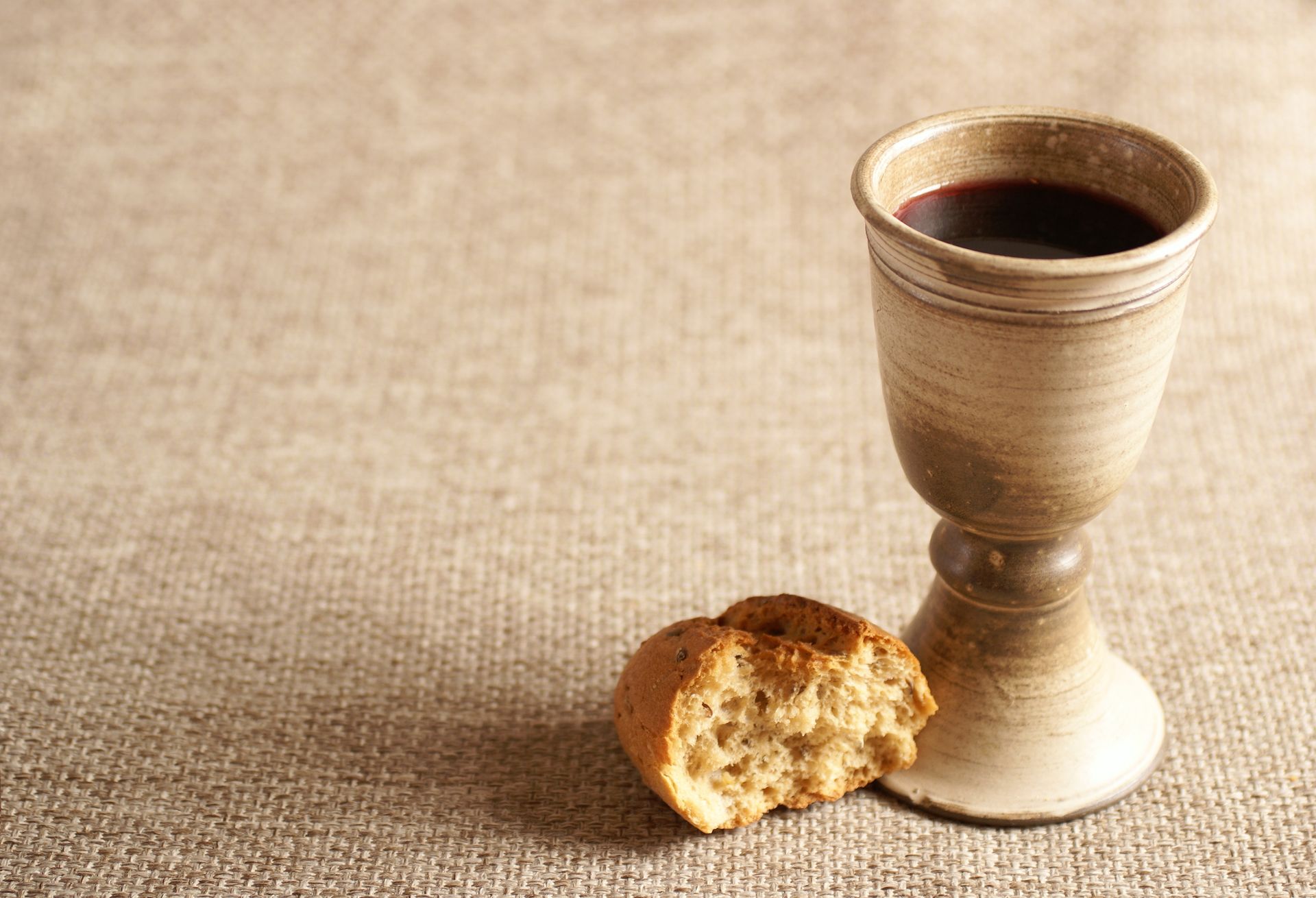
Signs of Bread and Wine
At the heart of the Eucharistic celebration are the bread and wine that, by the words of Christ and the invocation of the Holy Spirit, become Christ's Body and Blood. Faithful to the Lord's command the Church continues to do, in his memory and until his glorious return, what he did on the eve of his Passion: "He took bread. . . ." "He took the cup filled with wine. . . ."
The signs of bread and wine become, in a way surpassing understanding, the Body and Blood of Christ; they continue also to signify the goodness of creation. Thus in the Offertory we give thanks to the Creator for bread and wine, fruit of the "work of human hands," but above all as "fruit of the earth" and "of the vine" - gifts of the Creator.
-Catechism of the Catholic Church
Institution of the Eucharist
When Jesus instituted the Eucharist, he gave a final meaning to the blessing of the bread and the wine and the sacrifice of the lamb.
The Gospels narrate events that anticipated the Eucharist.
-The miracle of the loaves and fish, reported in all four Gospels, prefigured the unique abundance of the Eucharist.
-The miracle of changing water into wine at the wedding feast in Cana manifested the divine glory of Jesus and heavenly wedding feast in which we share at every Eucharist.
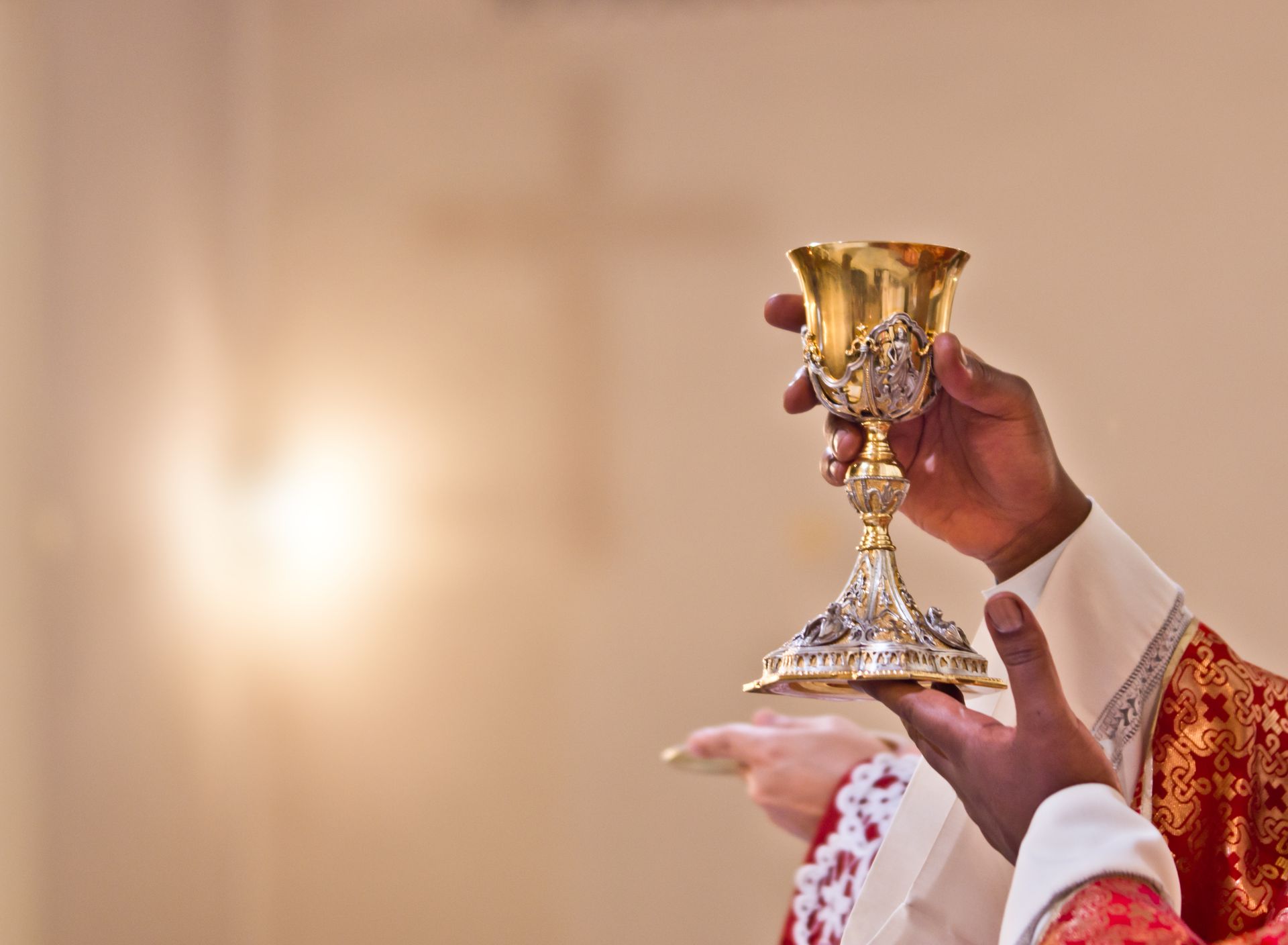
-In his dialogue with the people at Cappernaaum, Christ used his miracle of multiplying the loaves of bread as the occasion to describe himself as the Bread of Life:
"I am the living bread that came down from heaven...Unless you eat the flesh of the Son of Man and drink his blood, you do not have life within you."
-United States Catholic Catechism for Adults
What happens at the Consecration in the Mass?
By the consecration, the transubstantiation of the bread and wine into the Body and Blood of Christ is brought about. Under the consecrated species of bread and wine, Christ himself, living and glorious, is present in a true, real and substantial manner: His Body and Blood, with his soul and divinity.
(Catechism of the Catholic Church, no. 1413; Council of Trent: DS 1640, 1651)
The consecrated bread has become Christ's Body. The consecrated wine has become Christ's Blood. Jesus Chist is substantially present in a way that is entirely unique. This happens by the power of the Holy Spirit through the ministry of the priest's or bishops acting in the person of Christ during the Eucharistic Prayer.
At Mass, when we are offered the Host and hear the statement "The Body of Christ", we answer, "Amen",that is, "Yes, I believe."
-United States Catholic Catechism for Adults
The Real Presence of Christ
By the power of the Holy Spirit, Christ is present in the proclamation of God's Word, in the Eucharistic assembly, in the person of the priest, but above all and in wholly unique manner in the Eucharist.
"This presence is called 'real' by which is not intended to exclude the other types of presence as if they could not be 'real' too, but because it is presence in the fullest sense: that is to say, it is a substantialpresence by which Christ, God and man, makes himself wholly and entirely present."
(Catechism of the Catholic Church, no. 1374, citing Pope Paul VI, Mystery of Faith, no. 39)
Since the Middle Ages, the change of bread and wine into the Body and Blood of Christ has been called "transubstantiation". This means that the substance of the bread and wine is changed into the substance of the Body and Blood of Christ. The appearance of bread and wine remain (color, shape, weight, chemical composition), but underlying reality- that is, the substance- is now the Body and Blood of Christ.
-United States Catholic Catechism for Adults
What are the benefits of receiving the Eucharist?
Through participation in the Eucharist, we also participate in the Paschal Mystery of Christ, that is, in his dying and rising, which is made present for us in the Eucharistic sacrifice. This participation in the Paschal Mystery of Christ reaches its consumation when we receive his Body and Blood in Holy Communion. Christ's victory and triumph over death is then made present in the lives of those who participate in the Eucharist.
The person who receives the Eucharist is blessed with many graces.
- Holy Communion increases our union with Christ. "whoever eats my flesh and drinks my blood remains in me and I in him." (John 6:56). Communion with the Body of Christ preserves, increases, and renews the life of grace received at Baptism.
- Holy Communion separates us from sin. We receive the Body of Christ "given up for us" to save us from sin. We receive the Blood of Christ "shed for many for the forgiveness of sins". Our love of God is intensified and therefore our disordered attachments are weakoned and even broken. Divine love wipes away venial sins.
- Holy Communion offers us strength, called grace, to preserve us from mortal sin. By deepening our friendship with Christ, this Sacrament makes it more difficult for us to break our union with him by mortal sin.
- Holy Communion expands the life of the Church. The Church as a communion is bound ever more closely together through the celebration of the Eucharist. In receiving Communion, we are more fully united to the Church.
- Holy Communion commits us to care for the poor. Saint Paul reminded the Corinthians that in sharing the Body of Christ in the Eucharist, they were also called to care for the poorer members of the community. (cf. 1 Corinthians 11:17-34)
Participation in the celebration of the Eucharist sacrifice is a source and means of grace even apart from the actual reception of Holy Communion. It has been long understood that when circumstances prevent one from receiving Holy Communion during Mass, it is possible to make a spiritual communion that is also a source of grace. Spritual communion means uniting one's self in prayer with Christ's sacrifice and worshiping him present in his Body and Blood.
-United States Catholic Catechism for Adults
Food for Our Journey
The lives of the saints and blesseds show us the importance of the Eucharist on our journey as disciples of Jesus. Many testify to the power of the Eucharist in their lives. We see the fruits of Holy Communion in their lives of faith, hope, and charity. It was their intimate union with Jesus in Holy Communion and frequently their prayer before the Blessed Sacrament that nourished and strengthened them in their journey to heaven. They teach us that “growth in Christian life needs the nourishment of Eucharistic Communion, the bread for our pilgrimage until the moment of death, when it will be given to us as viaticum.”

Saint Carlo Acutis
Saint Carlo Acutis, a young Italian teenager, who died in 2006 at the age of fifteen was canonized on September 7th, 2025, used to say: “The Eucharist is my highway to heaven.” Saint Carlo attained sanctity at such a young age because the Eucharist was at the center of his life. He attended Mass daily and prayed each day before the Blessed Sacrament in adoration. He discovered the joy of friendship with Jesus and brought that joy, the joy of the Gospel, to others. He was an apostle of the Eucharist through the internet. Saint Carlo Acutis said: “To always be united with Christ: This is my life’s program.”
Saint José Sánchez del Río
Saint José Sánchez del Río, a Mexican teenager who was martyred at the age of fourteen and canonized in 2016, was so filled with love of Christ and his Church that he was willing to give up his life rather than renounce Christ and his Kingship. While imprisoned, Saint José Sánchez del Río was able to receive the Blessed Sacrament when it was smuggled into his cell along with a basket of food. Strengthened by this viaticum, he was able to endure torture and to remain faithful to Christ when his captors told him he must renounce his faith or be executed. He replied to his persecutors: “My faith is not for sale.”
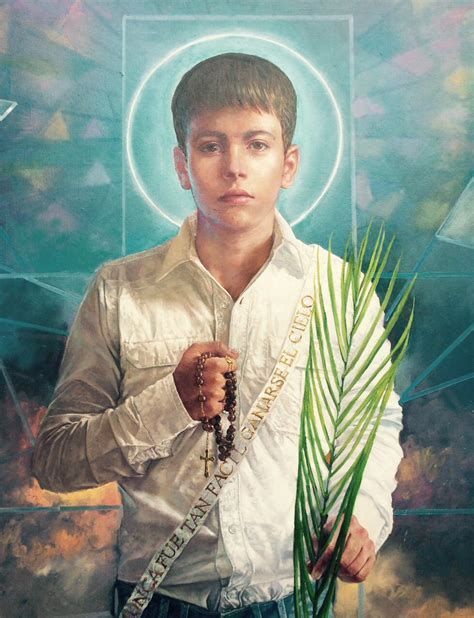
Search for the Truth
We encourage all, especially our young people, to learn about the lives of these holy teenagers. In the midst of many distractions in our life, Saint Carlo Acutis and Saint José Sánchez del Río teach us to focus on what is more important than anything else.
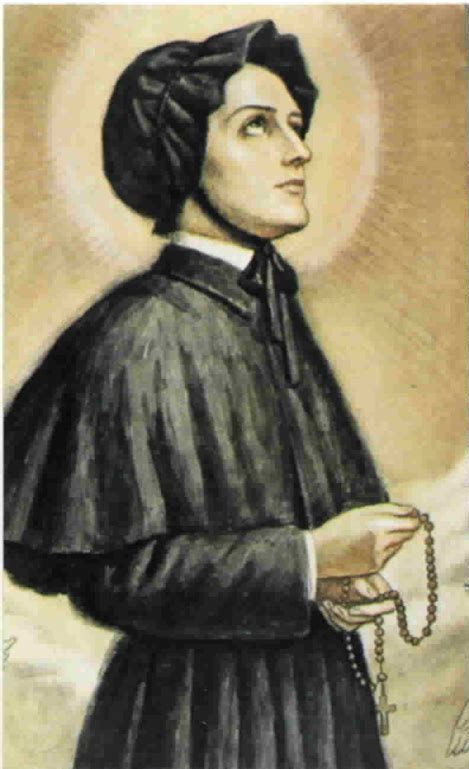
Saint Elizabeth Ann Seton
There are many people who have been attracted to the Catholic Church and entered the Church because they came to believe in the Real Presence of Christ in the Eucharist.
Our first U.S. born saint, Elizabeth Ann Seton, is one of these converts. She was drawn to enter the Catholic Church after she witnessed the devotion of Catholics to the Blessed Sacrament. She wondered about that devotion. God’s grace led her to faith in the Real Presence. While still an Episcopalian, she found herself at worship in her church in New York looking out the open window and praying to Jesus in the tabernacle one block away in a Catholic church. On the night after her entrance into the Catholic Church and her First Communion, Saint Elizabeth Ann wrote in her journal: “ At last GOD IS MINE and I AM HIS.” For the rest of her life, her deep faith and pioneering service to the Church in our young nation was nourished by the Holy Eucharist.
The celebration of Sunday observes the moral commandment inscribed by nature in the human heart to render to God an outward, visible, public, and regular worship "as a sign of his universal beneficence to all." Sunday worship fulfills the moral command of the Old Covenant, taking up its rhythm and spirit in the weekly celebration of the Creator and Redeemer of his people.
-Catechism of the Catholic Church, 2176
The Sunday Eucharist
The Sunday celebration of the Lord's Day and his Eucharist is at the heart of the Church's life.
"Sunday is the day on which the paschal mystery is celebrated in light of the apostolic tradition and is to be observed as the foremost holy day of obligation in the universal Church."
This practice of the Christian assembly dates from the beginnings of the apostolic age. The Letter to the Hebrews reminds the faithful
"not to neglect to meet together, as is the habit of some, but to encourage one another." Hebrews 10: 25
Tradition preserves the memory of an ever-timely exhortation. Come to Church early, approach the Lord, and confess your sins, repent in prayer...Be present at the sacred and divine liturgy, conclude its prayer and do not leave before the dismissal... We have often said: "This day is given to you for prayer and rest. This is the day that the Lord has made, let us rejoice and be glad in it."
-Catechism of the Catholic Church, 2177-2178
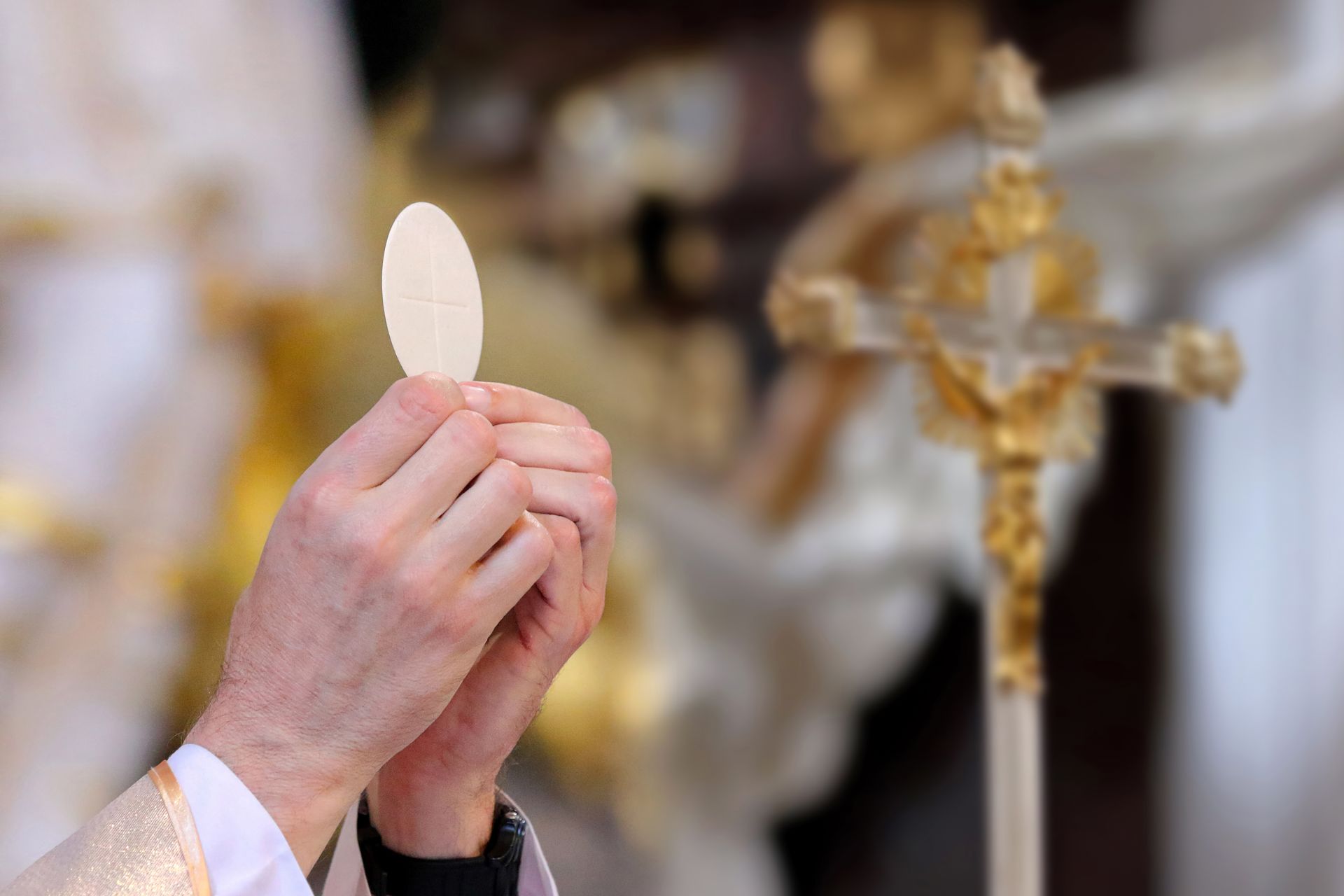
Participation in the communal celebration of the Sunday Eucharist is a testimony of belonging and of being faithful to Christ and to his Church. The faithful give witness by this to their communion in faith and charity. Together they testify to God's holiness and their hope of salvation. They strengthen one another under the guidance of the Holy Spirit.
-Catechism of the Catholic Church, 2182
The Sunday Obligation
The Precept of the Church specifies the law of the Lord more precisely: "On Sundays and other holy days of obligation the faithful are bound to participate in the Mass." "The precept of participating in the Mass is satisfied by assistance at a Mass which is celebrated anywhere in a Catholic rite either on the holy day or on the evening of the preceding day."
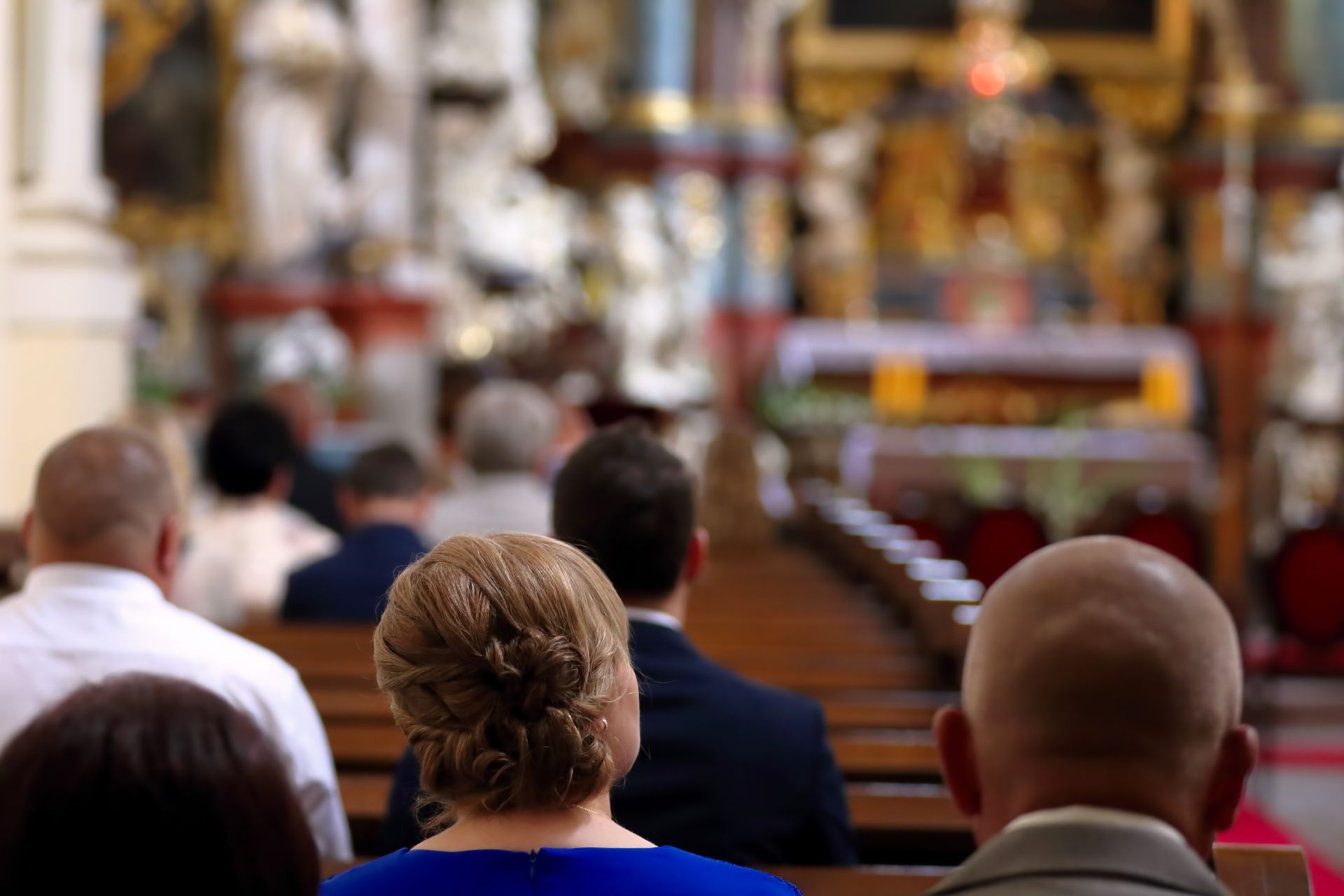
The Sunday Eucharist is the foundation and confirmation of all Christian practice. For this reason the faithful are obliged to participate in the Eucharist on days of obligation, unless excused for a serious reason (for example, illness, the care of infants) or dispensed by their own pastor. Those who deliberately fail in this obligation commit a grave sin.
-Catechism of the Catholic Church, 2180-2181
Guidelines for the Reception of Communion
The following guidelines seek to remind all those who attend Catholic liturgies of the present discipline of the Church with regard to the sharing of Eucharistic communion.
For Catholics
As Catholics, we fully participate in the celebration of the Eucharist when we receive Holy Communion.
- We are encouraged to receive Communion devoutly and frequently.
- In order to be properly disposed to receive Communion, particpants should be conscious of no grave sin
- Participants should have fasted for one hour.
- A person who is conscious of grave sin is not to receive the Body and Blood of the Lord without prior
sacramental confession except for a grave reason where there is no opportunity for confession. In this case, the person is to be mindful of the obligation to make an act of perfect contrition, including the intention of confessing as soon as possible (Code of Canon Law, 916). A frequent reception of the Sacrament of Penance is encouraged for all.
For Our Fellow Christians
We welcome our fellow Christians to this celebration of the Eucharist as our brothers and sisters. We pray that our common baptism and the action of the Holy Spirit in this Eucharist will draw us closer to one another and begin to dispel the sad divisions which separate us. We pray that these will lessen and finally disappear, in keeping with Christ's prayer for us "that they all may be one". (John 17:21)
Because Catholics believe that the celebration of the Eucharist is a sign of the reality of the oneness of faith, life and worship, members of those churches with whom we are not yet fully united are ordinarily not admitted to Holy Communion. Eucharistic sharing in exceptional cicumstances by other Christians requires permission according to the directives of the diocesan bishop and the provisions of canon law (Code of Canon Law, 844,4.)
Members of the Orthodox Churches, the Assyrian Church of the East, and the Polish National Catholic Church are urged to respect the discipline of their own Churches. According to Catholic discipline, the Code of Canon Law does not object to the reception of communion by Christians of these Churches (Code of Canon Law, 844,3).
For Those Not Receiving Holy Communion
All who are not receiving Holy Communion are encoraged to express in their hearts a prayerful desire for unity with the Lord Jesus and with one another.
For Non-Christians
We also welcome to this celebration those who do not share our faith in Jesus Christ. While we cannot admit them to Holy Communion, we ask them to offer their prayers for the peace and unity of the human family.
-United States Catholic Catechism for Adults
What can I do to strengthen my own faith and the faith of my family members?
Our weekly celebration of the Eucharist at Mass is at the very heart of our Catholic Faith.
As Catholics, we believe that when we receive the Eucharist, we receive no less than the Body, Blood, Soul and Divinity of our Savior, Jesus Christ.
As we prepare children for their First Eucharist we share with them the belief that Christ is present in the Eucharist and invites us to receive this precious gift of Himself every week.
Children who rarely and never attend Mass often feel lost when their catechists and peers enthusiastically discuss how much Jesus loves them and shows His love through the Eucharist. If for some reason your family does not presently attend Mass weekly, we encourage you to do so.
When we celebrate the Eucharist at Mass, we are participating in the Paschal Mystery of Christ, that is, in his Death and Resurrection which is made present for us in the Eucharistic sacrifice.
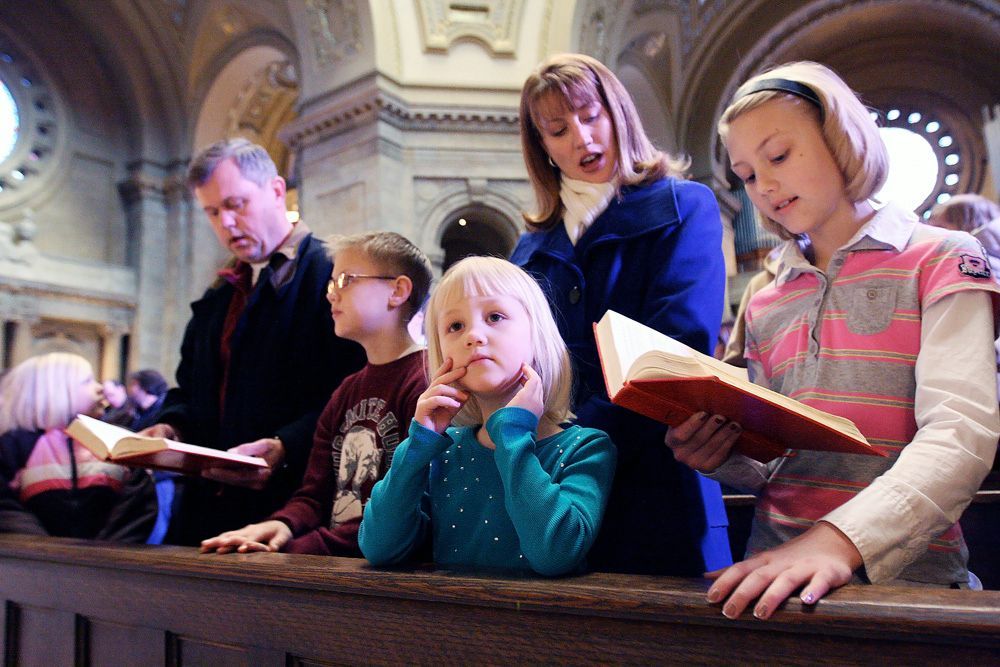
Use the beginning of your child’s preparation for the sacraments as your inspiration to begin participating in Mass consistently each and every week, so your child can feel comfortable approaching the Eucharist and to receive this precious gift of Christ.
When you search for Life, Truth, Love...the answer is God.
Being Catholic
"What are you looking for?", Christ asked of his disciples.
Are you new or have been away from the Church? Are you Catholic and have not received the Sacraments?
We welcome and invite you to learn more about the faith that Jesus Christ founded.
Mass Times & Confession Times
Join us and participate in the sacraments, VIEW HERE the schedules of Mass and Reconciliation.



